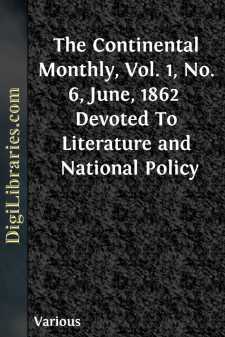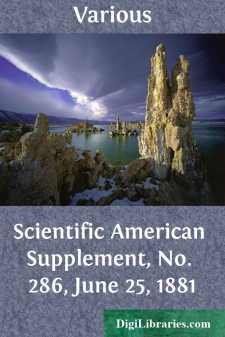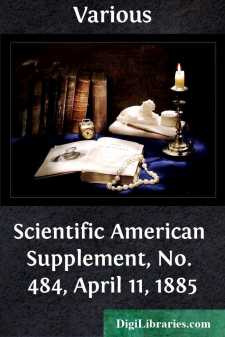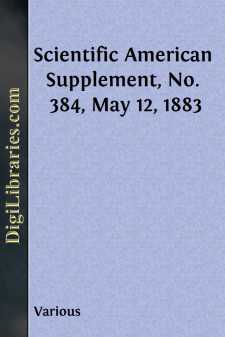Categories
- Antiques & Collectibles 13
- Architecture 36
- Art 48
- Bibles 22
- Biography & Autobiography 813
- Body, Mind & Spirit 142
- Business & Economics 28
- Children's Books 14
- Children's Fiction 11
- Computers 4
- Cooking 94
- Crafts & Hobbies 4
- Drama 346
- Education 46
- Family & Relationships 57
- Fiction 11828
- Games 19
- Gardening 17
- Health & Fitness 34
- History 1377
- House & Home 1
- Humor 147
- Juvenile Fiction 1873
- Juvenile Nonfiction 202
- Language Arts & Disciplines 88
- Law 16
- Literary Collections 686
- Literary Criticism 179
- Mathematics 13
- Medical 41
- Music 40
- Nature 179
- Non-Classifiable 1768
- Performing Arts 7
- Periodicals 1453
- Philosophy 64
- Photography 2
- Poetry 896
- Political Science 203
- Psychology 42
- Reference 154
- Religion 513
- Science 126
- Self-Help 84
- Social Science 81
- Sports & Recreation 34
- Study Aids 3
- Technology & Engineering 59
- Transportation 23
- Travel 463
- True Crime 29
The Continental Monthly, Vol. 1, No. 6, June, 1862 Devoted To Literature and National Policy
by: Various
Categories:
Description:
Excerpt
THE CONSTITUTION AND SLAVERY.
There are two sections of the United States, the Free States and the Slave States, who hold views widely different upon the subject of Slavery and the true interpretation of the Constitution in relation to it. The Southern view, for the most part, is:
1. The Constitution recognizes slaves as strictly property, to her bought and sold as merchandise.
2. The Constitution recognizes all the territories as open to slavery as much as to freedom, except in those cases where it has been expressly interdicted by the Federal Government; and it secures the legal right to carry slaves into the territories, and any act of Congress, restricting this right to hold slaves in the territories, is unconstitutional and void.
3. Slavery is a natural institution, and not to be considered as local and municipal.
4. The Constitution is simply a compact or league between sovereign States, and when either party breaks, in the estimation of the other, this contract, it is no longer binding upon the whole, and the party that thinks itself wronged has a right, acting according to its own judgment, to leave the Union.
5. This contract between sovereign States has been broken to such an extent, by long and repeated aggressions upon the South by the North, that the slave States who have seceded from the Union, or who may secede, are not only right in thus doing, but are justified in taking up arms, to prevent the collection of revenue by the Federal Government.
These ideas are universally repudiated in the free States. It is not my purpose to discuss the social or moral relations of slavery, but simply to consider under what circumstances the Constitution originated, and what was the clear intent of those who adopted it as the organic or fundamental law of the country. The last assumption taken by the seceding States grows out of the first four, and therefore it becomes a question of vital interest, what did the framers of the Constitution mean? We must remember that while names remain the same, the things which they represent in time go through a radical change. Slavery is not the same that it was when the Constitution was formed, nor are the original slave States the same. If freedom at the North has made great strides, so also has slavery South. Our country now witnesses a mighty difference in free and slave institutions from what originally was seen. The stand-point of slavery and freedom has altogether changed, not from {620} local legislation, but from natural causes, inherent in these two diverse states of society. New interests, new relations, new views of commerce, agriculture, and manufactures now characterize our country. It will not do then to infer, from the existing state of things, as originally the respective condition of the slaveholding and the free States, or what was in fact the import of that agreement, called the Constitution, which brought about the Federal Union. The framers of the Constitution did not reason so much as to what they should do for posterity as for the generation then living. As fallible men, much as they would wish to legislate wisely for the future, yet their very imperfection of knowledge precluded them from knowing fully what fifty or a hundred years hence would be the development of slavery or freedom. Their actions must have reference to present wants, and consult especially existing conditions of society. While they intended that the Constitution should be the supreme law of the land, yet they wisely put into the hands of the people the power of amending it at any such time as circumstances might make it necessary. The question then at issue between the North and the South is not what the Constitution should read, not what it ought to be, to come up to the supposed interests of the country; but what it does read. How is the Constitution truly to be interpreted? All parties should acquiesce in seeking only to find out the literal import of the Constitution as originally framed, or subsequently amended, and abide by it, irrespective altogether of present interests or relations. The reason is, in no other way can the common welfare of the country be promoted. If the necessities of the people demand a change in the Constitution, they can, in a legal way, exercise the right, always remembering that no republic, no free institutions, no democratic state of society can exist that denies the great principle of the rule of the majority. It becomes us, then, in order that we may come to a right decision respecting the duties that grow out of our Federal Union, to consider what language the Constitution makes use of, in relation to slavery, and how was this instrument interpreted by the framers. The great question is, was slavery regarded as a political and moral evil, to be restricted and circumscribed within the States existing under the Constitution, or was it looked upon as a blessing, a social relation of society, proper to be diffused over the territories? It can be clearly shown that there was no such state of feeling, respecting slavery, as to lead the originators of Constitution to look upon it as a thing in itself of natural right, useful in its operation, and worthy of enlargement and perpetuation. Rather, the universal sentiment respecting slavery, North and South, was, that as a great moral, social, and political evil, it should be condemned, and the widely prevalent impression was, that through the peaceful operation of causes that evinced the immeasurable superiority of free institutions, slavery would itself die out, and the whole country be consecrated to free labor....












